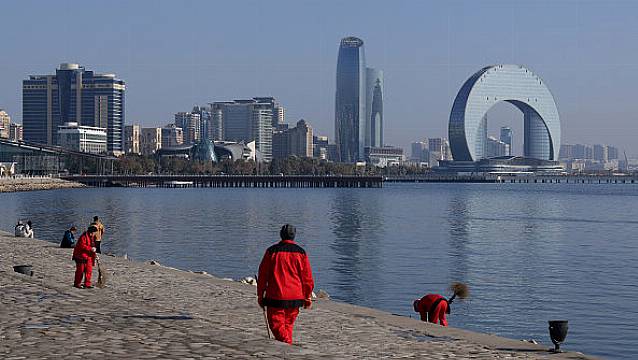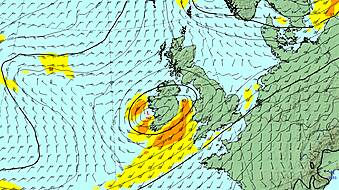The annual UN climate summit began on Monday with countries preparing for tough talks on finance and trade, after a year of weather disasters that have emboldened developing countries in their demands for climate cash.
Delegates gathering in Azerbaijan's capital, Baku, hope to resolve the Cop29 summit's top agenda item – a deal for up to $1 trillion (€935 billion) in annual climate finance for developing countries, replacing a target of $100 billion.
That goal is competing for resources and attention against economic concerns, wars in Ukraine and Gaza, and the election of Donald Trump, a climate-change denier, for a second term as president of the United States, the world's biggest economy.
The event's president, Mukhtar Babayev, said the world was "on a road to ruin" and the summit was a "moment of truth" for the world's climate goals.
"Azerbaijan can build the bridge, but you all need to walk across it. In fact, we need to start running," he told delegates at the Baku Stadium venue.
The Caspian Sea nation, which prides itself on being home to the world's first oil wells, faces pressure to show progress from last year's Cop28 pledge to transition away from fossil fuels.
Azerbaijan's oil and gas revenues accounted for 35 per cent of its economy in 2023, down from 50 per cent two years earlier. The government says these revenues will decline further, to 22 per cent by 2028.
Before summit talks start, countries need to agree an agenda, after China made an 11th-hour proposal to bring trade disputes into the mix.
The Chinese proposal – made on behalf of the "BASIC" group of countries including Brazil, India and South Africa – asked for the summit to address "restrictive trade measures" such as European Union carbon border tariffs going into effect in 2026.
Those concerns have been compounded by Trump's campaign promise to impose 20 per cent tariffs on all foreign goods, and 60 per cent on Chinese goods.
China's request showed it flexing its muscles after Trump's election, which signalled the United States' likely disengagement from global climate cooperation, said Li Shuo, director of China Climate Hub at the Asia Society Policy Institute.
Trump has called climate change a hoax and vowed to withdraw the US from the Paris Agreement, the global treaty to reduce planet-warming emissions.
The EU, along with current US president Joe Biden's administration, has been pressing China and Gulf oil nations to join the pool of climate finance donor countries.
"If the EU wants to talk about climate finance with China... part of the conversation should be how to resolve our differences on trade and your tariffs," Shuo said.
Extreme pressure
This year is on track to be the hottest on record, and experts said climate extremes – from flooding disasters in Africa, coastal Spain and the US state of North Carolina, to drought gripping South America, Mexico and the US West – were challenging rich and poor countries alike.
Most countries are not prepared.
"Election results don't alter the laws of physics," said Kaveh Guilanpour, vice president for international strategies at the nonprofit Center for Climate and Energy Solutions.
"Unless the world collectively steps up its efforts, the impacts of climate change will become increasingly severe and frequent and will be felt by an increasing number of people in all countries, including in the United States."
Many people gathered in Baku worry that US disengagement could lead other countries to backpedal on past climate pledges or scale back future ambitions.
"That is definitely a risk. People will be saying, well, the US is the second-biggest emitter. It's the biggest economy in the world ... If they don't set themselves an ambitious target, why would we?" Marc Vanheukelen, the EU's climate ambassador from 2019 to 2023, told Reuters.
Azerbaijan has been lobbying governments to accelerate their move to clean energy while touting gas as a transition fuel. President Ilham Aliyev has called Azerbaijan's fossil-fuel bounty "a gift of God," and Baku has proposed creating a Climate Finance Action Fund to collect voluntarily up to $1 billion from extractive companies across 10 countries including Azerbaijan.
Azerbaijan's gas exports to Europe this year are expected to exceed 12 billion cubic meters, after 11.8 billion cubic meters last year, as Europe seeks to reduce its reliance on Russian gas.
Presidential aide Hikmet Hajiyev said that, with its buildup of renewables, Azerbaijan was "moving from fossil fuel exports to green electricity exports." Baku aims to have renewable energy fueling 35 per cent of its power plant capacity by 2030. Last year, this figure was about 20 per cent.
Azerbaijan faces criticism of its jailing of political prisoners including journalists, and ethnic Armenians whom Baku describes as separatist leaders.
Aliyev has rejected the criticism and said it could undermine peace negotiations with Armenia.







